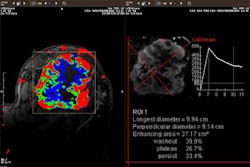Breast cancer screening is under attack once again. This time, a U.K. group suggests that "paternalistic agents of the state" are more concerned with achieving large-scale screening results than letting women know about the risks of mammography. As a result, women are kept in the dark about the down side of having regular mammograms, the group asserts in the latest issue of the British Medical Journal.
"Most women who are screened have neither suffered nor been educated about the reality of the uncertainties, harms, and limitations of screening or the consequences of finding pathology of borderline importance," wrote Hazel Thornton and colleagues (BMJ, July 12, 2003, Vol. 327:7406, pp.101-103).
Thornton is from the department of epidemiology and public health at the University of Leicester in England. She was diagnosed with ductal carcinoma in situ (DCIS) in 1991 and was subsequently invited to join the U.K. DCIS trial. However, she declined to participate because she felt she was not fully informed of the hazards of the study. Thornton’s co-authors are from the University of Wales in Swansea and University College in London.
The crux of their argument is that the decision to undergo screening is a judgment call, which an individual should be allowed to make. But most screening information, including scientific efficacy reports and patient education materials, falls short, the paper claims.
The group cited the "conflicting messages about the effect of screening," referring to disparate findings from meta-analyses of randomized cancer screening trials. They also stated that the anxiety associated with breast cancer tests might outweigh the benefits of screening. Part of this fear stems from common misconceptions about screening, such as the notion that early detection implies reduced mortality and is always beneficial, they added.
"When people are offered more detailed information about their personal risks they are less likely to opt for tests," they wrote. "Of course, most screening episodes end with the woman feeling reassured. But how many women realize that their risk of developing breast cancer in any one year remains at 2/1,000...?"
The authors called for the presentation of information to patients "in a balanced way, so that it is useful to people’s decision-making. Some women may say they don’t want this responsibility, but it is part of grownup decision-making."
The authors of this paper may be guilty of misinformation themselves, commented Dr. Daniel Kopans, director of breast imaging at Massachusetts General Hospital in Boston and a professor of radiology at Harvard Medical School.
Particularly worrisome is the group’s acceptance of the controversial 2001 Cochrane Centre review, Kopans said. The Danish report concluded that screening mammography does not reduce mortality, and may even result in unnecessary treatment because of overdiagnosis.
But repeated evaluation of the Cochrane review has found those results to be "incorrect or inconsequential," Kopans said. Yet Thornton and her colleagues give the Danish meta-analysis equal credence as other randomized, controlled studies involving multiple experts, he added.
"Thornton et al are absolutely correct when they state that women should be presented with complete information...fortunately, the vast majority of women who are screened for breast cancer will never develop it. This is not in question," Kopans wrote in an e-mail to AuntMinnie.com. "The point is that screening can decrease the death rate for women who do develop breast cancer. This has been shown conclusively in multiple studies and in multiple ways. The problem lies in the fact that there are supposed experts who chose to ignore, misinterpret, or misrepresent the scientific evidence."
The BMJ article comes days after a leading charity warned of a breast cancer crisis in the U.K. Breast Cancer Care called on the British government to conduct a review of plans for breast cancer care for the next 30 years, warning that an aging population would add more pressure on already stretched services. Breast cancer is currently the most common form of the disease in Britain.
By Shalmali PalAuntMinnie.com staff writer
July 11, 2003
Related Reading
Charity warns of looming breast cancer crisis, July 9, 2003
UK breast cancer cases at record levels, June 2, 2003
Britain plans to update cancer technology, May 23, 2003
Reassessment confirms: Screening mammography has no survival benefit, October 19, 2001
Copyright © 2003 AuntMinnie.com



















